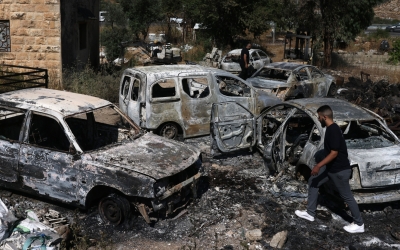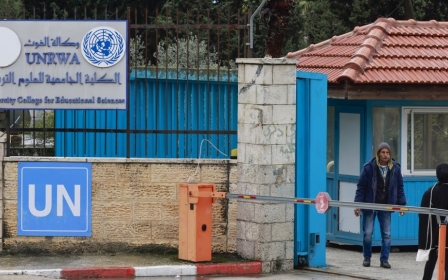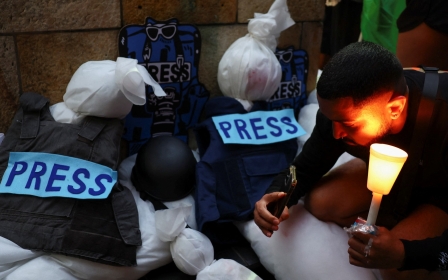War on Gaza: Israel strikes Rafah as raid on al-Amal hospital continues

The Israeli military on Friday pounded Rafah, on the border with Egypt, destroying two homes, killing at least eight people, and wounding 18.
The continued attacks on Rafah have raised concerns, particularly as the area has become overcrowded with forcibly displaced Palestinians.
UN Secretary-General Antonio Guterres said that Israel's plan for a military operation against Rafah will “exponentially increase what is already a humanitarian nightmare with untold regional consequences".
Guterres said on social media that he was alarmed by reports that “the Israeli military intends to focus next on Rafah”.
“Half of Gaza’s population is now crammed into Rafah with nowhere to go,” he added.
New MEE newsletter: Jerusalem Dispatch
Sign up to get the latest insights and analysis on Israel-Palestine, alongside Turkey Unpacked and other MEE newsletters
The Palestinian Red Crescent expressed worry over the safety of its medical teams, wounded people, and patients, as Israeli forces continue to raid al-Amal Hospital.
The organisation later announced that they had completely lost contact with their teams working in the al-Amal Hospital in Khan Younis, “due to the occupation's continuous raid on the hospital".
Ashraf al-Qudra, the spokesperson for the Palestinian health ministry, said that since 7 October, Israeli forces have killed 340 health personnel and arrested 99.
At least 123 ambulances have been destroyed in the same time frame, he added.
Israeli snipers also killed 21 people in Khan Younis, who were sheltering in the Nasser Hospital. A reporter on the ground for Al Jazeera said that Israeli snipers were “shooting at every moving object” and that the area had become very dangerous.
The spokesperson for the UN children’s fund (Unicef) warned that Gaza is now witnessing the worst level of child malnutrition worldwide.
James Elder made the comments in an interview with Al Jazeera, adding that there is now “no safe area in Gaza and civilians must be provided with water and shelter. The [Israeli] restrictions imposed make it difficult for us to carry out our work in the Gaza Strip.”
Children out of school
The war on Gaza has also had a significant impact on children, with the head of the UN agency for Palestinian refugees (Unrwa) stating that the attacks on the besieged enclave have put over 500,000 children out of school.
“Every day of war deepens the scars, risking a lost generation vulnerable to exploitation,” Philippe Lazzarini said in a post. “Children are being robbed of childhood.”
The government media office in Gaza reiterated the statement, saying that there is “escalating famine” in north Gaza, which is worsening daily.
The UN also estimated that there are around 12 million tonnes of debris from Israel’s destruction of residential homes in Gaza, which will take more than four years to clean, UNOCHA said in its latest situation report.
The death toll in Gaza since the start of the war is nearing 28,000, according to the Palestinian Ministry of Health.
The ministry added that 107 Palestinians were killed and 142 wounded over the last 24 hours, in what they described as “13 massacres”.
An additional 67,400 Palestinians have been wounded since 7 October.
Arab states call for ceasefire
Israel also attacked Syria on Friday, Syrian state media reported, with Syrian air defences responding to “hostile targets” in the vicinity of Damascus.
The United Arab Emirates (UAE) has called for a meeting of Arab states to prevent an escalation of conflict in the region that took place in Riyadh on Friday.
In a meeting, the Emirati foreign minister met with ministers from Saudi Arabia, Qatar, Egypt, Jordan, and the secretary-general of the executive committee of the Palestine Liberation Organisation.
All parties reiterated calls for an "immediate and complete ceasefire", as well as "irreversible" steps towards the recognition of a Palestinian state during the talks, Saudi state media reported.
Meanwhile, Israeli forces continued to carry out raids in the occupied West Bank.

In the town of Beit Furik, east of Nablus, Israeli troops used live fire during a raid, which also included an arrest campaign in the area.
At least 6,940 people have been detained since 7 October, according to the Palestinian Prisoner’s Society.
Separately, South Africa's Foreign Minister Naledi Pandor has accused Israeli intelligence of trying to intimidate her and her family after the International Court of Justice (ICJ) recently ruled that it was “plausible” that Israel’s actions could amount to genocidal acts.
In its ruling, the ICJ ordered Israel to prevent harm to Palestinians in Gaza and allow aid.
Pandor said she has spoken to the police about increasing her security detail after she received threatening messages.
“I felt that [it would] be better if we had extra security. But what I’m more concerned about is my family, because in some of the social media messages my children are mentioned and so on, but this is par for the course,” Pandor said.
“The Israeli agents, the intelligence services, [this] is how they behave, and they seek to intimidate you, so we must not be intimidated. There is a cause that is underway.”
Middle East Eye delivers independent and unrivalled coverage and analysis of the Middle East, North Africa and beyond. To learn more about republishing this content and the associated fees, please fill out this form. More about MEE can be found here.





